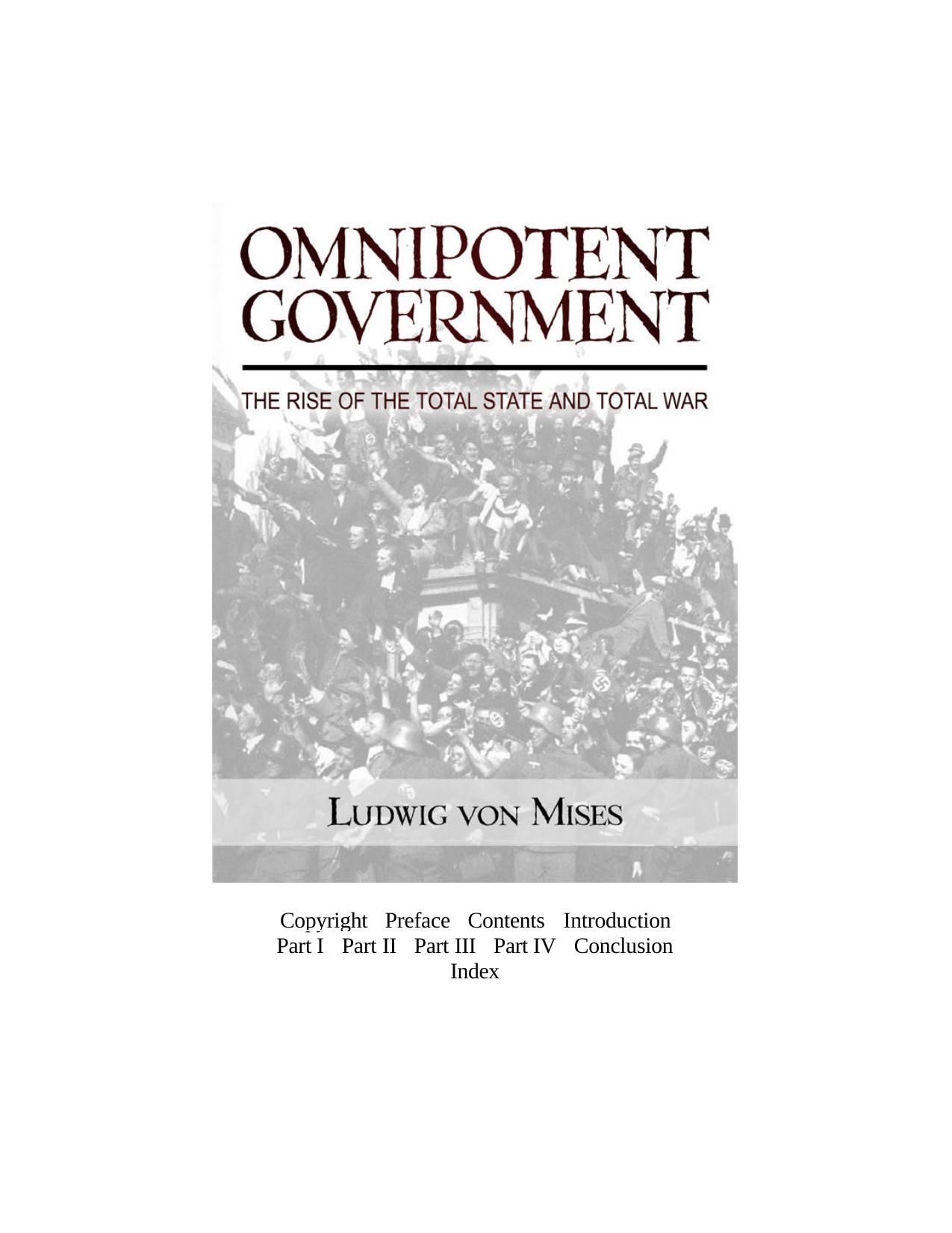Omnipotent Government: The Rise of the Total State and Total War by Ludwig von Mises

Author:Ludwig von Mises [von Mises, Ludwig]
Language: eng
Format: epub, pdf
Publisher: Yale University Press
Published: 2010-11-06T16:00:00+00:00
7. Pan-Germanism and Nazism
The essential ideas of Nazism were developed by the Pan-Germans and the socialists of the chair in the last thirty years of the nineteenth century. The system was completed long before the outbreak of the first World War. Nothing was lacking and nothing but a new name was added later. The plans and policies of the Nazis differ from those of their predecessors in imperial Germany only in the fact that they are adapted to a different constellation of political conditions. The ultimate aim, German world hegemony, and the means for its attainment, conquest, have not changed.
One of the most curious facts of modern history is that the foreigners for whom this German nationalism was a menace did not sooner become aware of the danger. A few Englishmen saw through it. But they were laughed at. To Anglo-Saxon common sense the Nazi plans seemed too fantastic to be taken seriously. Englishmen, Americans, and Frenchmen seldom have a satisfactory command of the German language; they do not read German books and newspapers. English politicians who had visited Germany as tourists and had met German statesmen were regarded by their fellow countrymen as experts on German problems. Englishmen who had once attended a ball at the court in Berlin or dined in the officers’ mess of a Potsdam regiment of the Royal Guards came home with the glad tidings that Germany is peace loving and a good friend of Great Britain. Proud of their knowledge acquired on the spot, they arrogantly dismissed the holders of dissenting views as “theorists and pedantic doctrinaires.”
King Edward VII, himself the son of a German father and of a mother whose German family did not assimilate itself to British life, was highly suspicious of the challenging attitudes of his nephew, William II. It was to the King’s credit that Great Britain, almost too late, turned toward a policy of defense and of coöperation with France and Russia. But even then the British did not realize that not the Kaiser alone but almost the whole German nation was eager for conquest. President Wilson labored under the same mistake. He too believed that the court and the Junkers were the instigators of the aggressive policy and that the people were peace loving.
Similar errors prevail today. Misled by Marxian prejudices, people cling to the opinion that the Nazis are a comparatively small group which has, through fraud and violence, imposed its yoke on the reluctant masses. They do not understand that the internal struggles which shook Germany were disputes among people who were unanimous in regard to the ultimate ends of German foreign policy. Rathenau, whom the Nazis assassinated, was one of the outstanding literary champions both of German socialism and of German nationalism. Stresemann, whom the Nazis disparaged as pro-Western, was in the years of the first World War one of the most radical advocates of the so-called German peace—i.e., the annexation of huge territories at both western and eastern borders of the Reich. His Locarno policy was a make-shift devised to give Germany a free hand in the East.
Download
Omnipotent Government: The Rise of the Total State and Total War by Ludwig von Mises.pdf
This site does not store any files on its server. We only index and link to content provided by other sites. Please contact the content providers to delete copyright contents if any and email us, we'll remove relevant links or contents immediately.
The Secret History by Donna Tartt(16705)
The Social Justice Warrior Handbook by Lisa De Pasquale(11501)
Thirteen Reasons Why by Jay Asher(7824)
This Is How You Lose Her by Junot Diaz(5818)
Weapons of Math Destruction by Cathy O'Neil(5068)
Zero to One by Peter Thiel(4858)
The Myth of the Strong Leader by Archie Brown(4805)
Promise Me, Dad by Joe Biden(4467)
Beartown by Fredrik Backman(4457)
How Democracies Die by Steven Levitsky & Daniel Ziblatt(4439)
Stone's Rules by Roger Stone(4434)
The Fire Next Time by James Baldwin(4363)
100 Deadly Skills by Clint Emerson(4103)
A Higher Loyalty: Truth, Lies, and Leadership by James Comey(4051)
Rise and Kill First by Ronen Bergman(4036)
The David Icke Guide to the Global Conspiracy (and how to end it) by David Icke(3908)
The Farm by Tom Rob Smith(3890)
Secrecy World by Jake Bernstein(3800)
The Doomsday Machine by Daniel Ellsberg(3747)
